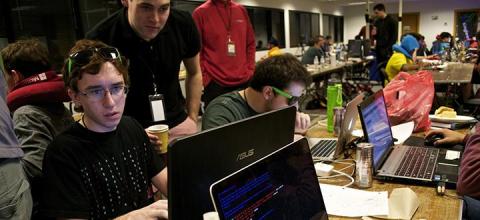
14 May Hackers push their creative limits at hackathon organized by CS students
By Jennifer Smith, UW-Madison – Computer Sciences
Part techie marathon, part slumber party, university hackathons are a booming national trend. More than 150 are expected to take place this year alone, up from just 40 last year, according to a recent New York Times story.
The University of Wisconsin-Madison joined that growing trend this past April with its first large-scale hackathon–dubbed MadHacks–organized and run by students in the Department of Computer Sciences.
Hackathon participants have a defined period—typically 24 hours—to build the most ingenious thing they can conjure up using a range of technologies, from Kinect motion-sensing devices to Oculus Rift virtual-reality headsets.
While some competitors are driven by prizes or the chance to network with companies, others are motivated by the creative thrill of pushing one’s own limits.
Spearheaded by director Leo Rudberg, a junior from Lake Forest, Ill., and assistant director Katie Anderson, MadHacks 2015 was a rousing success, drawing about 225 attendees from across the Midwest, as well as a range of corporate sponsors who underwrote the event and hosted information tables.
It’s a major undertaking to organize, promote and run an event of this scale, particularly for the first time. Rudberg and Anderson were part of a team of about ten organizers who spent a year planning the event, which was sanctioned by Major League Hacking. Says Rudberg, “I’m really happy overall with how it went. People produced really good projects, and we had a really friendly environment. We stayed true to our mission that we would encourage people to take creative risks.”
Part of what set MadHacks apart from similar competitions was having participants themselves select the winners in various categories, rather than a panel of judges. The top prize, in the “Wisconsin Idea” category devoted to civic-minded or educational apps, was an all-expenses-paid trip to a hackathon in Seoul, Korea.
Other categories included the best game, best visuals and best “retro hack” (built only from technology available in 1990).
While Rudberg won’t be on the organizing committee for next year’s MadHacks, he’s excited to see what 2016 will bring and plans to pitch in. “I hope this invigorates the hacker community at Wisconsin,” he says. “I can’t wait to see what the new team does next year.”
Faculty and alumni also played a role in MadHacks’ strong debut. Associate professor Ben Liblit served as the event’s faculty advisor. Computer sciences alumnus Eric Martell (BS ’12), chief operating officer of the Madison company EatStreet, delivered a keynote talk to the eager hackers.
Faculty associate Perry Kivolowitz gave a second keynote, in which he talked about what it means to have the “hacker spirit.” Kivolowitz lamented the current use of the word “hacker” to mean someone who engages in criminal behavior, such as infiltrating companies’ computer systems. Kivolowitz encouraged students to embrace the word’s earlier, positive meaning: someone who likes to tinker, innovate and create.
“Hacking is that maddening, frustrating, joyous and euphoric process of beginning with nothing and ending with something,” Kivolowitz told MadHacks participants.
Microsoft was the lead sponsor for the event, which took place April 18-19 at University Research Park on Madison’s west side. A Sunday dinner and closing ceremony were held at Epic, the health care software company based in Verona, Wis.
The university’s Division of Information Technology provided critical support, such as providing WiFi access to participants.
Learn more about MadHacks on its website or in coverage from Madison’s Capital Times. View aphoto album on Facebook put together by Major League Hacking, powered by Dell and Intel, with photos by Joshua Stromer.
[Photo credit: Courtesy of Major League Hacking, powered by Dell & Intel. Pictured are Martin Wickham and Scott Hendrickson, UW-Madison students and winners of the “Alchemist” award for best use of multiple API’s. Their project was called wikimine and allowed one to see where edits on Wikipedia pages come from. Photo used with permission.]
– Re-posted from UW-Madison – Computer Sciences


